Lordhair Base Size

Base size is the size of the cap of a hair system.
We have different base size (6”x8”, 6”x9”, 7”x9”, 8x10”) in stock, and we also have base cutting service to cut to your special base size.
However, it's recommended to order a custom order if the base size is more than 8”x10”.
For base size in custom order, we roughly separate them into 4 types.
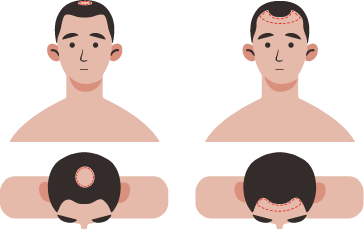
Partial size (Frontal)
size ≤ 7” x 10”, or area ≤ 70 square inches
In the early stages of hair loss, some clients only experience hair loss is isolated areas, i.e. the front hairline or crown area.
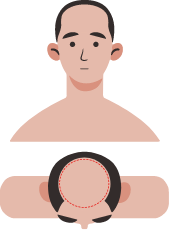
Regular size (Topper)
7"x10" < size ≤ 8"x10", or 70 square inches < area ≤ 80 square inches
It is the most popular option for men with traditional male pattern hair loss and covers the hair loss area on the top of the head from the front hairline to the crown.
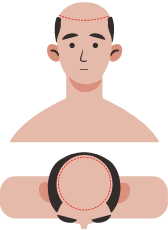
Oversize (or larger size)
8"x10" < size ≤ 10"x10", or 80 square inches < area ≤ 100 square inches
The hair loss area extends further down the side and back of the head. The hair system does not have a temple (sideburn) area or nape area.
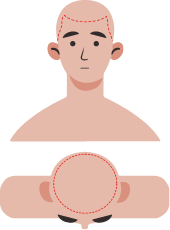
Full cap
Base size > 10"x10", or area > 100 square inches
Full cap hair systems are most common with women or men who have complete hair loss (It is the best choice for chemotherapy patients who suffer severe hair loss) or prefer total coverage of the scalp.
How to measure the size?
Length
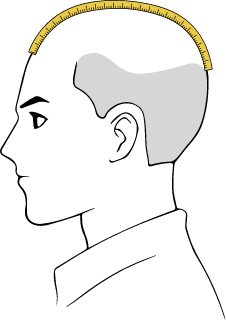
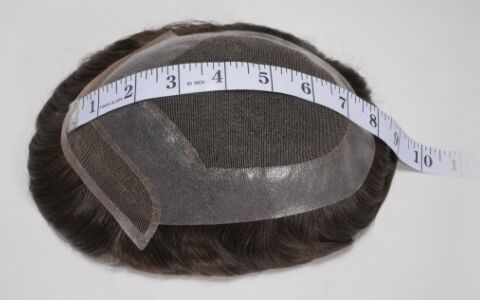
Length: Place the tape measure at the center of the front hairline, and measure directly across the middle of the head. It's the same way to measure the base width of the hair system.
Width
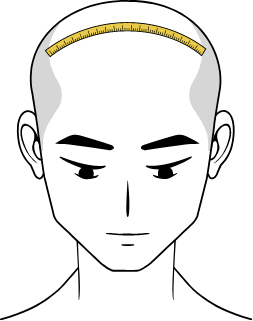
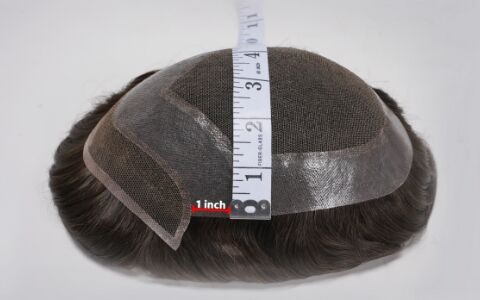
Width: Place tape measure at one side of the head, the beginning point should be 1" distance from the temple point, then go up across the top to the opposite side (also 1" back from the temple point).
How to measure full cap?
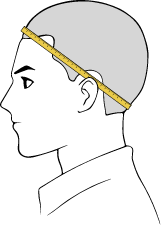
Step 1: Circumference
This measures the distance around your head. Starting at the center of the front hairline, place the tape flat against your head, going just above the ear towards the back of the head, keeping the tape at the nape of your neck and going around to the opposite side of your head, just above the opposite ear and returning to the center of the front hairline.
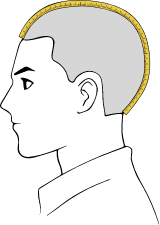
Step 2: Front to nape
Place the tape at the center of the front hairline, measure directly across the middle top of your head to the nape of your neck.
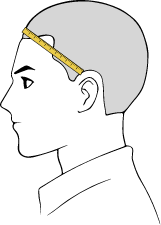
Step 3: Ear to ear across forehead
Place the tape at your temple, just in front of your ear, measure from hairline at the base of your sideburn, go up across the hair line along your forehead to the same point in front of the opposite ear.
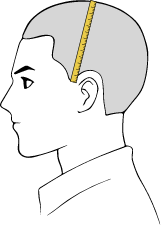
Step 4: Temple to temple (over top of head)
(i.e., Sideburn to sideburn)Place the tape at the bottom edge of the sideburn in front of your ear and go directly across the top of head to the bottom edge of the opposite sideburn.
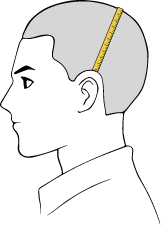
Step 5: Ear to ear over top
Place the tape from hairline edge at the top of your ear and go directly across the top of your head to the hairline edge at the top of the opposite ear.
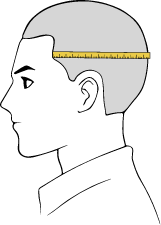
Step 6: Temple to temple round back
Place the tape against your head at the front edge of the hairline (temple area), go around the head above the occipital bone to the opposite front edge of the hairline (the opposite temple area).
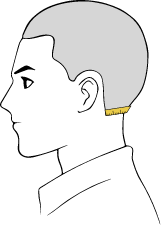
Step 7: Nape of neck
This measures the width of hairline across the nape of the neck. Place the tape at the lowest point on the bone behind your ear (mastoid bone) and measure across the neck to the opposite mastoid bone.

Get Full Cap Wig Measurements Form

Helpful tips for taking correct measurements:
1. Use cloth measuring tape.
2. Measure holding the tape snug, but not tight against the head.
3. Keep tape flat against your head and do not allow kinks and twists to develop in the tape.
4. Take the measurements at least 3 times with the same tape to ensure accuracy. Consistent measurements are an indication that you are measuring correctly. If you do not measure properly, your hair system may not fit.
Using the measurements you provide, we will make your system base on a regular scalp curvature. However, the best way to get your exact base size is sending in a template or spare system, which is helpful for us to examine the pattern, size and scalp curvature of your bald area so that we can follow these details exactly when making your customized system. Click here to check how to make a template.